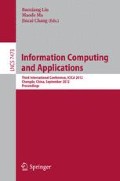Abstract
This Paper gives an introduction of Random Forest. Random Forest is a new Machine Learning Algorithm and a new combination Algorithm. Random Forest is a combination of a series of tree structure classifiers. Random Forest has many good characters. Random Forest has been wildly used in classification and prediction, and used in regression too. Compared with the traditional algorithms Random Forest has many good virtues. Therefore the scope of application of Random Forest is very extensive.
Access this chapter
Tax calculation will be finalised at checkout
Purchases are for personal use only
Preview
Unable to display preview. Download preview PDF.
References
Breiman, L.: Bagging Predictors. Machine Learning 24, 123–140 (1996)
Amit, Y., Geman, D.: Shape quantization and recognition with randomized trees. Neural Computation 9, 1545–1588 (1997)
Dietterich, T.: An Experimental Comparison of Three Methods for Constructing Ensembles of Decision Trees: Bagging, Boosting and Randomization. Machine Learning, 1–22 (1998)
Ho, T.K.: The random subspace method for constructing decision forests. IEEE Trans. on Pattern Analysis and Machine Intelligence 20(8), 832–844 (1998)
Breiman, L.: Using adaptive bagging to debias regressions, Technical Report 547, Statistics Dept. UCB (1999)
Breiman, L.: Random Forests. Machine Learning 45(1) (2001)
Tibshirani, R.: Bias, Variance, and Prediction Error for Classification Rules, Technical Report, Statistics Department, University of Toronto (1996)
Wolpert, D.H., Macready, W.G.: An Efficient Method to Estimate Bagging’s Generalization Error. Machine Learning (1997) (in press)
Breiman, L.: Out-of-bag estimation [EB/OL] (June 30, 2010), http://stat.berkeley.edu/pub/users/Breiman/OOBestimation.ps
Breiman, L.: Predition Games and Arcing Algorithms. Neural Computation 11, 1493–1517 (1999)
Bauer, E., et al.: An Empirical Comparison of Voting Classification Algorithms: Bagging, Boosting, and Variants. Machine Learning 36, 105–142 (1999)
Freund, Y., Shapire, R.: Experiments with a new boosting Algorithm. In: Machine Learing: Proceedings of the Thirteenth International Conference, pp. 148–156 (1996)
Ho, T.K.: Random: Decision Forests. In: Proceeding of the 3rd International Conference on Document Analysis and Recognition, Montreal, Canada, August 14-18, pp. 278–282 (1995)
Author information
Authors and Affiliations
Editor information
Editors and Affiliations
Rights and permissions
Copyright information
© 2012 Springer-Verlag Berlin Heidelberg
About this paper
Cite this paper
Liu, Y., Wang, Y., Zhang, J. (2012). New Machine Learning Algorithm: Random Forest. In: Liu, B., Ma, M., Chang, J. (eds) Information Computing and Applications. ICICA 2012. Lecture Notes in Computer Science, vol 7473. Springer, Berlin, Heidelberg. https://doi.org/10.1007/978-3-642-34062-8_32
Download citation
DOI: https://doi.org/10.1007/978-3-642-34062-8_32
Publisher Name: Springer, Berlin, Heidelberg
Print ISBN: 978-3-642-34061-1
Online ISBN: 978-3-642-34062-8
eBook Packages: Computer ScienceComputer Science (R0)

